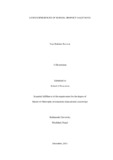
Please use this identifier to cite or link to this item:
https://hdl.handle.net/20.500.14301/261| Title: | LIVED EXPERIENCES OF SCHOOL DROPOUT DALIT BOYS |
| Authors: | Kunwar, Yam Bahadur |
| Citation: | Kunwar,Y.B.(2013).Lived experience of school dropout dalit boys. |
| Issue Date: | Dec-2013 |
| Publisher: | Kathmandu University School of Education |
| School: | SOED |
| Department: | DOEL |
| Level: | M.Phil. |
| Program: | MPhil in Educational Leadership |
| Abstract: | My interest in lived experiences of School dropout Dalit boys was grown-up with the closed observation of Dalit community nearby my birth place. It helped me to generate the research issues and questions. And the epistemological position was started from the lived experience of educationally excluded Dalit boys. After excluded from the light of education, they had to work in difficult working circumstances to fulfill their basic needs. Similarly, non-Dalits or so-called people used to misbehave them in working circumstances even using non-honorific words. This thesis explores the caste based hierarchy in relation to educational exclusionary practices on the basis of field experience and literatures. It also explores the underlying realities of educationally excluded Dalit boys. Similarly, this thesis tries to explore the barriers of School dropout Dalit youths (boys) to be excluded from the educational access. The analysis and interpretation in this thesis is based on the data from literature and documents, and the field experiences of two Dalit communities: West Village and East Village of Kathmandu District. This research study is an attempt to generate the meaning of lived experiences of school dropout Dalit boys observing their daily activities and their life experiences to address ii the research question first, future life expectations and factors for affecting educational exclusion to make the meaning of the research question second and third. This representation of the issue of lived experiences of school dropout Dalit boys is tried to contextualize within the socio-cultural and economic context of Hindu societies in Nepal. As I understood, this research study is different from other studies because this thesis was conducted to make the meaning of the lived experiences of SD Dalit boys about their life worlds, future expectations and major barriers for their SD problem which are not discussed by other research studies, and most of the Dalit studies are conducted about their right based issues and their cased based discriminations. Actually, this thesis contributes to the literature concerned with understanding culturally legitimized issue of educational access in Nepal observing the educational inclusion and exclusion. This thesis interprets how schooling in Dalit community has reproduced structural discrimination and inequality or symbolic violence. Similarly, this thesis explores the developing schooled identity to enhance the relationships between Dalit and non-Dalit children. Such relationships have been creating a kind of debate on their social power and relations. To make the meaning of the research study, I applied mainly the paradigms of interpretive under the multi-paradigmatic research design. Under the multi paradigmatic research design, I applied critical ethnographic research method as my methodological position. This thesis provides the guidelines to think of again about the recent policy practices and to revise the policies and implement immediately to the concerned body to address the issues of school dropout Dalit boys who have been spending their productive age in bad activities like drug addiction and less productive activities. |
| URI: | https://hdl.handle.net/20.500.14301/261 |
| Appears in Collections: | Dissertation |
Files in This Item:
| File | Description | Size | Format | |
|---|---|---|---|---|
| Revised Final Thesis-2013-MPhil -APA checked.pdf | 988.55 kB | Adobe PDF |  View/Open |
Items in DSpace are protected by copyright, with all rights reserved, unless otherwise indicated.